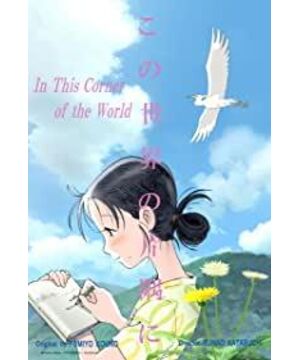This is a work based on Japanese historical views, so in this sense, it is a leftist film. It is understandable to say that this is a wash. But obviously, this is not a rightist work.
The reason for this conclusion is very simple: regardless of the fact that the Japanese right wing does not often mention the Hiroshima issue, those who are familiar with Yamamoto Kan, look at Kan Kuan’s historical view of history, that is, the general Japanese right wing tends to the public, and you will be able to find that, Such a detailed depiction of the many details of the war in this work is inconsistent with the actions of the Japanese right wing.
"In This Corner of the World" is an animated film about the history of World War II produced by Mappa in Japan. Since it involves sensitive historical topics, in order to avoid suspicion, I first set a tone for this work.
The above explanation is to allow you to face this work with a peaceful mind. I know this work because of anitama's interview translation. "Your Majesty is about to fight to the death, why did His Majesty surrender first." This interview mentioned a very clear point, but it did not perform well in the work, that is, looking at the essence aside from the phenomenon, the Japanese people were able to survive the war because of Even at the end of the war, Japan continued to exploit the food of the people in the enemy-occupied areas from Puppet Manchuria, Ryukyu (Taiwan) and the Korean Peninsula. The oppression and exploitation started from the war, no, since the Taisho era, that is, after the Russo-Japanese War, Japan began to extract food from the Manchuria area. And the Korean Peninsula began to uninterruptedly transport industrial resources and food supplies to local industries and social operations, and the general Japanese people have been directly linked to war responsibilities since then. A scene manifested.
A Ling has an inner monologue: "It's the rice and rice shipped from across the sea that feed me... So we can only succumb to violence..." This line has been modified from the original manga. The original line is more straightforward: "Do we submit to violence because we use violence to make others obey? Is this the truth of this country."
It is precisely because of the fact that the ordinary people represented by A-Ling, in order to logically provide a self-consistent explanation for their own sacrifice, they continue to use the methods of promoting the operation of the violent state apparatus to satisfy themselves. It is precisely because of this that in the After the "Emperor" Yuyin was broadcast, she would say why she did not continue to resist, why she had insisted on this step, and she had to voluntarily give up the operation of the violent state machine. This is a kind of oppression and shackles that you give yourself. It was after abandoning this shackle and reviewing her past life experience that she realized that what she did was based on violence, stemming from one tea and one meal, which was why she burst into tears, she could not prove her innocence . From her disbelief, to awareness and awakening, to belief, it was her confession process.
As a digression, I reviewed the history of modern Japan starting from the Russo-Japanese War because of a little research on the background of Jingdian. It can be said that from the beginning of the Russo-Japanese War, the Taisho prosperity caused by Japan has always been brought about by the exploitation accompanied by imperialist expansion. Without the sufferings of the people in the Northeast, the Korean Peninsula, and Taiwan, the cultural, economic and social prosperity of the Taisho period would not have been possible. In addition to the "nostalgic" sense of nostalgia for the prosperous Tang Dynasty, the reminiscence of the Taisho period and Taisho Niang, which is popular in Japan today, has a layer of pungent irony.
Therefore, among the Chinese people, those who are extremely fond of "traditional Japanese culture", that is, a large part of Taisho culture and a small group of ancient Japanese bushido and monk culture, stroll through the imitation European and American ancient buildings and glazed tile rooms in Kyoto, and take pictures in old sea tea kimonos. Those people, do you know what you are doing? Especially the friends in the Northeast and Yanbian areas, the culture you are pursuing may be directly related to the history of oppression of your ancestors. Do you really realize this? Taisho culture is imperialist prosperity. It is obtained by exploitation rather than creativity. It is unsustainable and should not be sought after. At least, the next time I "walk the streets of Kyoto", I will "accept and absorb culture critically with the vision of appreciating art", instead of licking it like Taijun, such a deformed culture can be appreciated, licked, not worthy.
The above statement is based on the scene of the "new modern" woman in the play going to a western restaurant. This section can help you understand the modern history of Japan. You must know that the exploitation of Japanese imperialism began in 1905, not the Taisho era in 1912, let alone militarism and 918. This is the result of a continuous bloodthirsty imperialism advancing step by step, and we must pay attention to the continuity of history. Therefore, the heroine's life, until the defeat, is accompanied by this. Therefore, the reflection of this work, from the first half, is a reflection on Japan's imperialist expansion methods and the evil consequences they brought, namely, the fiasco of World War II.
If this work ends with the heroine crying because of the defeat, maybe the depth of this work will be even higher, and it will also get better feedback from Chinese audiences. But please note that this is a work with the Japanese people as its main target. The significance of this work is not even any point in the first half. Because in the eyes of the Japanese, the first half can be summed up in one sentence: The evil consequences of our militarism have made everyone on the verge of collapse, and such a Japan is about to end. For the current people living on Japanese soil, "what to do" is more important than "reflection". Therefore, the screenwriters added a lonely villain, an orphan, an incapacitated person, and a mentally traumatized person to form the image of a mother and son, which is a symbol of modern Japanese society. Look ahead, move forward. While doing this, it ignored the thinking of war and militarism, ignored the numbness of the Japanese people for a long time after the war, and failed to solve the biggest problem: the Japanese people are profiled exploiters, and they have been subjected to such a Suffering, what about the exploited in the enemy-occupied territories? When you can still buy sugar, what are the people of the Northeast eating? ! The results of it? No pushback, no apology, not even, or toned down reflection. This is the biggest flaw of this work, because this work is given to the Japanese. In today's Japan, there is no cultural understanding of the unification war, no systematic view of national history, and the mouth is still stubborn. It is extremely difficult for them to accept the defeat in World War II, the nuclear explosion of Hiroshima, and the substantive occupation of the United States. Why bother to care about the lives and circumstances of others? This is the historical limitation of this work. But not evidence that the work is "right-leaning". Even if this work is not so critical, it still explains the historical facts clearly, and it is still a left-leaning work in Japan.
When watching this work, I always think of "Alive" and "Farewell My Concubine". For the former, it is a movie version and more a novel. How should I put it, Yu Huading has a deeper thought than the original work of this work, and even the movie version is better than the Japanese work. It is amazing that even though the people of the two countries are faced with a chaotic national history, we have done better than others. This is something we should be proud of. The Japanese are really good at deceiving themselves. Nor can we forget our experiences, we have always done better than others.
However, I am sure that people who came here, especially the intellectuals who have been beaten among them, will be dissatisfied, just like some people in the country are like "In this Corner of the World". No way, we all need to improve. But I am very happy to see that some Japanese people are starting to do these historically fixed things. Really, especially when there are right-wing speeches on Japanese sns, such voices are particularly important.
Summary: This is an excellent first half, but the ending is light. It is a pity that the profoundness of thought is not qualified to be seen by the Chinese people. All in all, it's still a very interesting and meaningful work. 8.3-8.5/10 stars.
make persistent efforts.
View more about In This Corner of the World reviews











